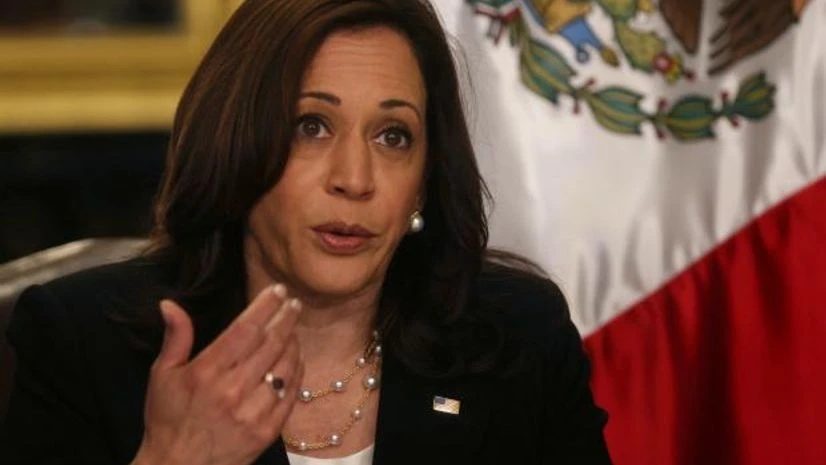Pledging that the Biden administration is determined to help India in its hour of need due to surging COVID-19 infections and deaths, Vice President Kamala Harris has said that India's welfare is critically important to the United States.
Describing the surge of COVID-19 infections and deaths in India as "nothing short of heartbreaking, she said that the entire Biden administration has been galvanized to help the country in its fight against the pandemic.
India is struggling with a second wave of the pandemic with more than 4,00,000 daily new coronavirus cases being reported in the past few days, and hospitals are reeling under a shortage of medical oxygen and beds.
"At the beginning of the pandemic, when our hospital beds were stretched, India sent assistance. And today, we are determined to help India in its hour of need, Harris said on Friday in her opening remarks at the State Department's Diaspora outreach event on US COVID Relief for India.
"We do this as friends of India, as members of the Asian Quad, and as part of the global community. I believe that if we continue to work together - across nations and sectors - we will all get through this, she said.
Also Read
The Biden-Harris Administration has announced USD 100 million assistance to India to deal with the COVID-19 pandemic. In about a week's time, as many as six plane loads of COVID-19 assistance have landed in India. The entire administration has been galvanised to help India in this hour of crisis. The White House and the State Department is coordinating with the corporate sector, which has mounted an unprecedented private sector relief for any country ever.
Indian-Americans have been raising millions of dollars and have been sending life-saving health care equipment and medicines to India. Sewa International USA has raised more than USD 10 million, American Association of Physicians of Indian-Origin or AAPI have raised USD 3.5 million and Indiaspora more than USD2 million, to name some of them.
In her remarks, Harris recognised the contribution of Indian-Americans on the issue. Harris, 56, is the first woman, the first Black American, and the first South Asian American to be elected US Vice President.
"For years, diaspora groups like Indiaspora and the American India Foundation have built bridges between the United States and India. And this past year, you have provided vital contributions to COVID-19 relief efforts. Thank you for your work, said the vice president.
"As many of you know, generations of my family come from India. My mother was born and raised in India. And I have family members who live in India today. The welfare of India is critically important to the United States, Harris said.
"The surge of COVID-19 infections and deaths in India is nothing short of heartbreaking. To those of you who have lost loved ones, I send my deepest condolences. As soon as the dire nature of the situation became apparent, our Administration took action, she said, referring to the steps that the Biden-Harris Administration has taken to help India in this hour of crisis.
On April 26, President Joe Biden spoke with Prime Minister Narendra Modi to offer America's support. By April 30, US military members and civilians were delivering relief on the ground, she said, referring to the whole-of-government approach that the administration has taken to help India.
"Already, we have delivered refillable oxygen cylinders, with more to come. We have delivered oxygen concentrators, with more to come. We have delivered N95 masks, and have more ready to send. We have delivered doses of Remdesivir to treat COVID patients," Harris said.
According to USAID, among the emergency supplies to India include 20,000 courses of remdesivir (125,000 vials) to help treat critically ill patients; nearly 1,500 oxygen cylinders to address critical oxygen shortage, which can be repeatedly refilled at local supply centers and one million rapid diagnostic tests to quickly identify COVID-19 cases and prevent community spread.
The six planes, that have landed in just six days, also included nearly 550 mobile oxygen concentrators that obtain oxygen from ambient air. These units have a lifespan of more than five years and can serve multiple patients at once, depending on their oxygen needs. The US has also sent nearly 2.5 million N95 masks to protect health care professionals and other frontline workers.
A large-scale deployable Oxygen Concentration System that can provide oxygen to treat 20 or more patients at a time and 210 pulse oximeters to measure oxygen levels in a patient's blood to determine whether a higher level of care is needed has also been sent to India, USAID said.
In her remarks, Harris also referred to the decision taken by her administration to support a proposal by India and South Africa for a TRIPS waiver for vaccines at the WTO.
"We have announced our full support for suspending patents on COVID-19 vaccines - to help India and other nations vaccinate their people more quickly. India and the United States have the greatest number of COVID-19 cases in the world, Harris said.
Senior Advisor Ervin Massinga at the Bureau of South and Central Asian Affairs said that the US was doing everything we can to help India.
"We are bringing to bear the strength, innovation, and unique capabilities of the American people to assist those suffering in India. And we recognize that the pandemic will not be over for anyone until it is over for everyone," Massinga said.

)
